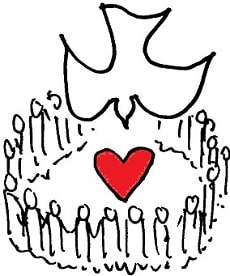
« Jesus breathed on them and said, ‘Receive the Holy Spirit' » (John 20:23).
Pentecost Sunday
Acts 2:1-11l PS 104; 1 Cor 12:3b-7, 12-13; Jn 20:19-23
How will we know if Pentecost has come to us? The readings for today’s solemnity describe the followers of Jesus as receiving the power to forgive one another and to reconcile others to God. Forgiveness and reconciliation are the essence of Pentecost.
The scene in the upper room is worth imagining. The disciples who gathered behind closed, locked doors were filled with fear and guilt. When Jesus was seized by the authorities, nearly all of them had run away. Judas, one of their own inner circle, had betrayed Jesus to death. Peter, their supposed leader, had denied he even knew Jesus.
What could they possibly say to one another? Surely Peter did not dare to offer any assurance, and their cowardice was only multiplied by the tension and anger they must have felt toward one another. Once it was safe to depart the city, they would scatter in every direction, never wanting to see each other again.
Into this gloom and anguish the risen Jesus suddenly appears. His first words to his disciples are « Peace be with you. » Peace! Their Master is alive and greeting them with peace. He shows them his wounds. His pierced hands and feet, his open side, tell of his suffering and death. The disciples are stunned.
Jesus then breathes on them. The last gesture of his death on the cross becomes the first gesture of his gift of new life to them. They are like the inert, lifeless clay of Adam at the moment of creation. Jesus breathes the Holy Spirit into his disciples, recreating them to be what they could not possibly have become before this moment. His holy breath enters and transforms them, enabling them to accept forgiveness for their failure and then turn and forgive one another. They ae no longer a distraught huddle of broken men, but now bold ambassadors of peace and reconciliation.
The Acts of the Apostles tells the same story. On Pentecost, the great festival of harvest and the giving of the Law, the Holy Spirit descends like wind and fire on the disciples. Strangers from every part of the great diaspora surround them, and the Apostles preach the Good News of Jesus in every language. The scattering of Babel that divided the world is healed. Unity is possible again as the Holy Spirit reconciles everyone in the name of Jesus.
The church is created at Pentecost to reconcile us to God and to heal the divisions among us that have led to conflict, misunderstanding, competition, fear and hatred. Evangelization is the ministry of reconciliation, within the church and to the world.
How do we know if Pentecost has come to us? If we are filled with the desire to resolve conflict and bring people together around their common hopes and desires, the Spirit is with us. If we have the courage to be peacemakers in our own families and neighborhoods, the Spirit is with us. If we seek to disarm our culture of weapons and hate speech and can ourselves be witnesses to the power of listening and welcoming those with whom we disagree, the Spirit of Jesus is alive within us. This is what Pentecost is about.